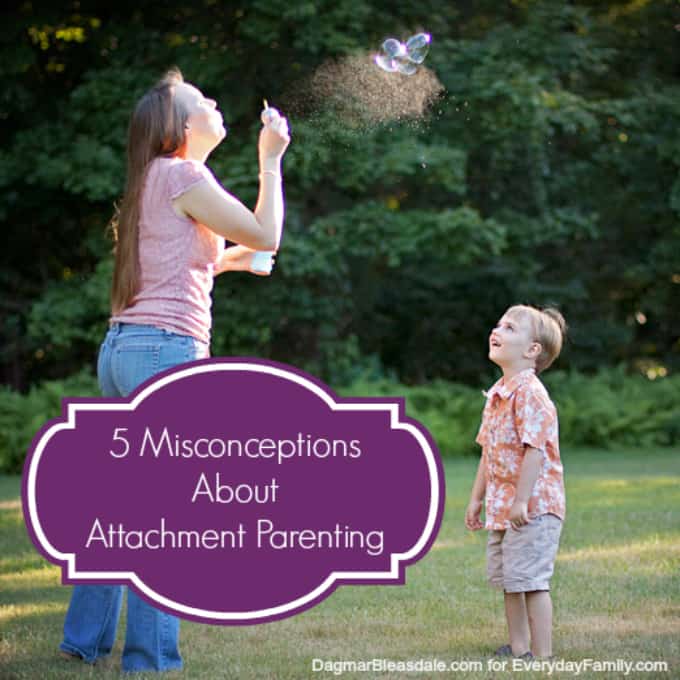I’m a big advocate for attachment parenting after my positive experience with it.
Many people are still confused about what AP entails, so I’ve compiled a list of what AP is and is not.
Do you want to know if attachment parenting is for you? This post will help you figure that out.
When I became a mom for the first time, I simply followed my instinct. I wasn’t seeking out advice from my mom, family, or friends because I felt strongly about my parenting choices, and they worked for our family.
Our son slept in our bed from the first day on, and we never ended up using the crib we had for him. After struggling with breastfeeding for the first two weeks, I learned to latch him on correctly and nursed him for years.
I also practiced babywearing and gentle parenting – I wanted to raise my son in a loving, compassionate way.
After two years I realize that my parenting style had a name, after reading Dr. Sears’ The Attachment Parenting Book.
Dr. Sears believes that “close attachment after birth and beyond allows the natural, biological attachment-promoting behaviors of the infant and the intuitive, biological, caregiving qualities of the mother to come together.”
Attachment parenting includes birth bonding, breastfeeding, co-sleeping, responding to baby’s crying, close bonding (including babywearing), ignoring schedules, and taking care of yourself.
5 Misconceptions About Attachment Parenting
1. Attachment Parenting is Not Difficult
I found attachment parenting to be very easy — all I did was get in tune with my motherly instincts. That’s easier to do when you don’t have a lot of opinionated family members and friends telling you how they raised their kids.
I’m glad i followed my doula’s suggestion to have hardly any visitors in the first few weeks after my son’s birth so i could get to know him on my own terms.
It felt natural to me to want my son near me at all times when he was a baby, and bed sharing made for much easier breastfeeding during the night. I didn’t have to get up several times a night to check on him or get my son for a feeding. I actually don’t remember feeling terribly exhausted when he was little – we were both getting great sleep from the beginning.
Being with my son all the time and closely connected allowed me to really get to know my son’s needs – he would cry when hungry but didn’t care about a wet diaper, for example – and that made me a more relaxed parent. I just followed his lead.
2. Attachment Parenting is About Being Yourself and Finding Your Own Parenting Style
If attachment parenting wasn’t an easier, more organic choice, millions of moms around the world wouldn’t practice it. The idea of putting kids in cribs in separate nurseries is a pretty recent concept – attachment parenting was the norm before that.
How many parents do you know that ended up co-sleeping, for example, because they figured out after trial and error that it worked best for their family? Those parents listened to the need of the baby to want to be close to his or her caregiver, and both parent and baby ended up with better sleep.
3. Attachment Parenting is Not Indulgent
Attachment parenting doesn’t mean you give into every one of your child’s demands – it means knowing when your child needs something or just wants something. If your baby cries, you have the urge to pick him or her up, which is natural and what the baby needs. A baby doesn’t have any other way to communicate, and it’s not indulgent to pick up your baby. It would be unnatural to keep yourself from picking up your baby.
I personally responded to my son’s cries right away and being held or being nursed calmed him down immediately, which made for a happy baby and happy mom. I wasn’t afraid to go anywhere with him because I knew how to soothe him if he got fussy.
If you know your baby or toddler well, you can differentiate between a tantrum and a need, and react accordingly. Attachment parenting is intuitive parenting, but it also means setting boundaries, which children need to learn.
Even though I was told by several people to put my son on a schedule, to “break him” of his need to be held to fall asleep, it made no sense to me to schedule when I would feed him or put him down for a nap. He transitioned into his own bed at age 3 without problem because he felt secure and comfortable thanks to consistently having his needs met.
My son is not a spoiled child because of attachment parenting – he is a well-liked, easy-going little boy, and I attribute a lot of that to the attention he got as a baby, mixed with boundaries and expectations.
4. Attachment Parenting Does Not Mean You Are a Martyr
I never felt like a martyr. Wanting to be close to my baby and reacting to his needs came naturally. I didn’t find attachment parenting restricting – I found it actually very freeing.
Following my maternal instincts felt like I was being true to my feelings, and my baby was responding to this attentive, gentle kind of parenting by being a very easy-going child I could take anywhere with me.
Attachment parenting also doesn’t mean that you have to be home full-time – many parents who practice AP work full-time.
Attachment parenting does not mean forgetting about your own needs.
To me, AP doesn’t just mean standing up for your baby’s needs and picking him up even when Aunt Sue tells you that you are spoiling your child. It also mean taking good care of yourself and making time for yourself, and speaking up for your own needs.
Being there for your child on demand around the clock is a big job, and if you need a break or help with cleaning the house or just don’t feel like doing the dishes, don’t! Be proud of all you’re doing and delegate what you can’t do at the moment.
The time when your baby needs you this much is very short – enjoy it. Doing the dishes can wait, and if someone has a problem with them piling up in the sink, I’d suggest they wash them.
5. Attachment Parenting is Not About Following all of the AP Characteristics
Does Bed sharing just not work for your family? That’s doesn’t mean you can’t practice some of the other AP characteristics, like baby wearing. Every baby and family is different — just figure out what works best for your situation.
You might be a working mom and can’t be with your child as much as you’d like, but nursing your baby or co-sleeping or babywearing when you are together will make up for the closeness you are missing during the day.
Do you practice any aspect of attachment parenting? Do you find that this gentle parenting style works for you?
You can find more attachment parenting resources on Dagmar’s Home, including many posts I’ve written about my experience with and guidelines for safe bed sharing and extended breastfeeding.



Leave a Reply